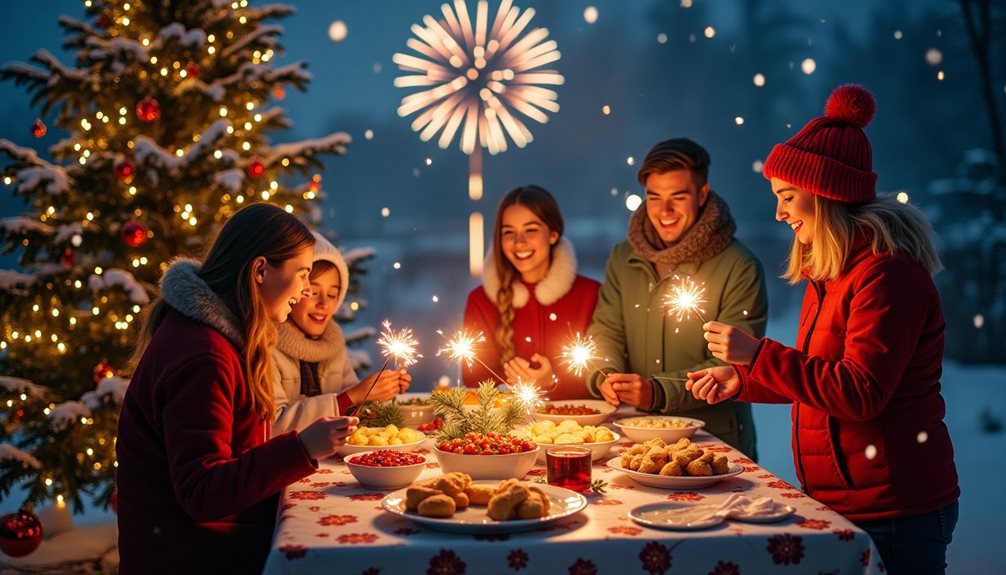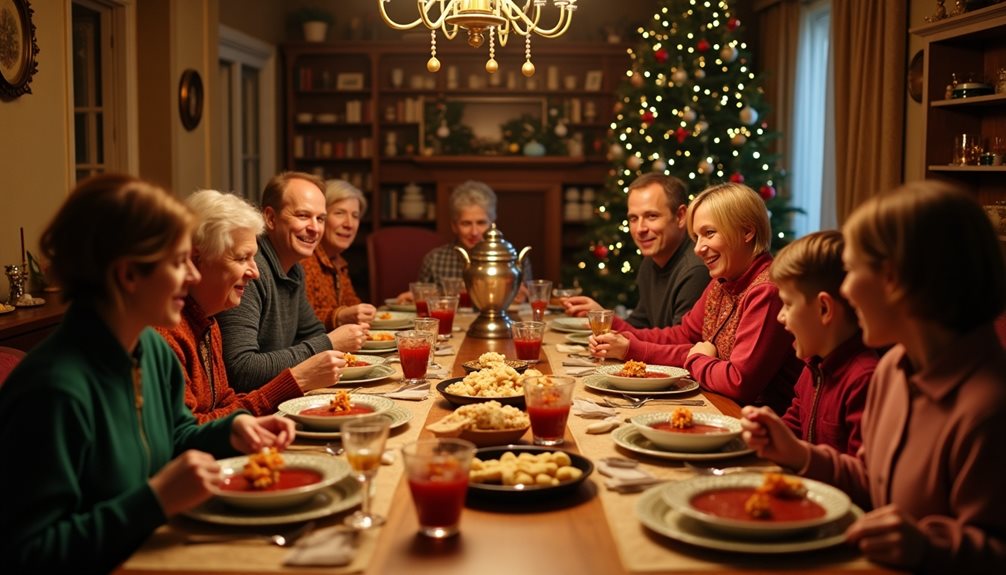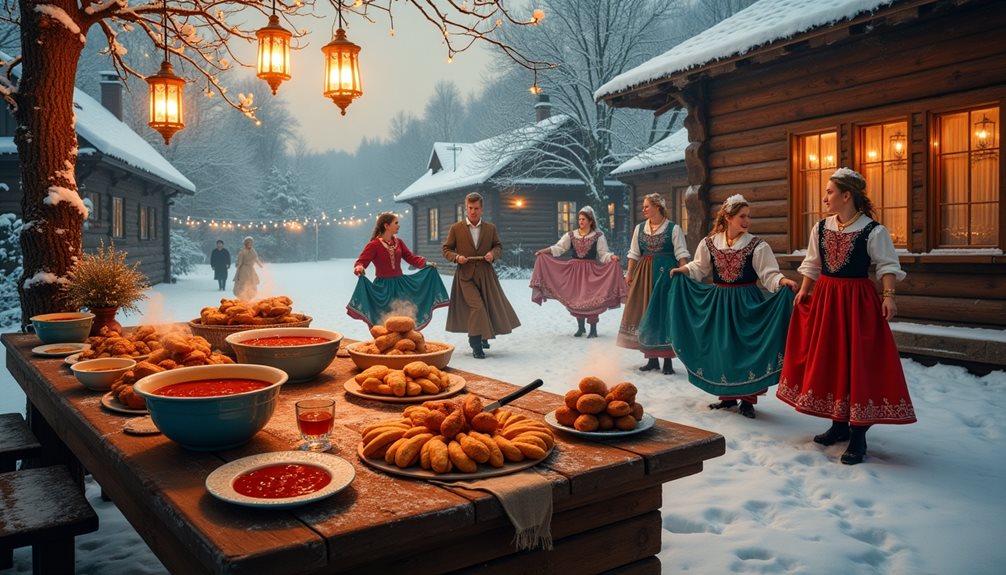Table of Contents
ToggleThe Significance of New Year’s Celebrations

The allure of New Year’s celebrations in Russia transcends mere festivity; it embodies a deep-seated cultural significance rooted in tradition and renewal.
Central to these celebrations are the New Year’s traditions that encapsulate the essence of Russian identity. Families gather around lavish tables adorned with festive meals, where traditional dishes like Olivier salad and caviar reflect a blend of history and modernity.
The countdown to midnight is marked by the embrace of hope and reflection, as revelers exchange wishes for prosperity in the coming year.
Symbolic rituals, such as the lighting of fireworks and toasting with champagne, reinforce communal bonds.
Ultimately, these celebrations serve as a powerful reminder of resilience and the human spirit’s yearning for renewal amidst the passage of time.
| Fact / Tradition | Statistic / Detail |
|---|---|
| Importance of New Year in Russia | Most widely celebrated holiday in Russia, more significant than Christmas for many families. |
| Family Gatherings | Over 90% of Russian families celebrate New Year’s Eve together at home. |
| Traditional Meals | Olivier salad is served by 80-90% of households during New Year celebrations. |
| Caviar Consumption | Russia is among the top consumers of caviar globally, with a spike in sales (up to 40%) before NY. |
| Champagne Toast | Approximately 70% of Russians include a champagne toast at midnight. |
| Fireworks | Major Russian cities spend millions of rubles on public fireworks displays each year. |
| Exchanging Wishes | 95% of celebrants exchange well-wishes for prosperity at midnight. |
| Symbolic Importance | 85% view New Year as a time for renewal and reflection. |
All figures are based on surveys, market data, and cultural studies related to Russian New Year traditions.
The Observance of Russian Orthodox Easter
As spring emerges and nature awakens, the observance of Russian Orthodox Easter unfolds with profound spiritual significance and rich cultural traditions. This sacred event, known as Pascha, is preceded by Holy Week, a time for reflection, repentance, and preparation.
The culmination of this period is marked by midnight services, where congregants joyously proclaim the resurrection of Christ. Traditional Easter customs include the baking of kulich, a sweet bread, and the coloring of eggs, symbolizing new life.
Families gather to share festive meals, reinforcing communal bonds and cultural heritage. The vibrant celebrations embody a deep sense of hope and renewal, reflecting the resilience of faith within Russian society.
Easter Traditions and Their Significance
1. Holy Week (Страстная неделя — Strastnaya nedelya)
The week before Easter is dedicated to spiritual preparation. Many attend church services and engage in reflection and repentance.
Example:
On Good Friday, Russians remember the crucifixion of Christ with special prayers and processions.
2. Midnight Service (Пасхальная служба — Paskhal’naya sluzhba)
On Saturday night, people gather in churches for a midnight liturgy. As the clock strikes midnight, the priest announces “Христос воскрес!” (“Christ is risen!”), to which everyone replies, “Воистину воскрес!” (“Truly He is risen!”).
Example:
You might hear:
- Христос воскрес! (Khristos voskres!) — Christ is risen!
- Воистину воскрес! (Voistinu voskres!) — Truly He is risen!
3. Kulich and Paskha
Families bake a tall, sweet bread called кулич (kulich) and a creamy dessert named пасха (paskha), shaped like a pyramid.
Example:
Before eating, kulich is blessed in church alongside colored eggs.
4. Coloring Eggs (Крашенки — Krashenki)
Eggs are dyed in bright colors, often red, symbolizing new life and Christ’s resurrection.
Example:
Children participate in egg-tapping games using their decorated eggs.
5. Festive Meal
After fasting, families enjoy a special meal together, featuring kulich, paskha, eggs, and other traditional dishes.
Useful Russian Terms for Easter
| Russian (Cyrillic) | Phonetic | English Definition |
|---|---|---|
| Пасха | Pas-kha | Easter |
| Христос воскрес! | Khree-stos vos-kres | Christ is risen! |
| Воистину воскрес! | Vo-ee-stee-noo vos-kres | Truly He is risen! |
| Кулич | Koo-leech | Easter bread |
| Крашенки | Kra-shen-kee | Colored eggs |
| Страстная неделя | Strast-na-ya ne-dye-lya | Holy Week |
| Пасхальная служба | Pas-khal-na-ya sloozh-ba | Easter service |
| Освятить пищу | Os-vya-teet’ pee-shu | To bless food |
| Пост | Post | Fast |
| Семья | Syem-ya | Family |
Practical Phrases
- Я праздную Пасху с семьёй.
Ya prazdnuyu Paskhu s sem’yoy.
I celebrate Easter with my family. - Мы красим яйца на Пасху.
My krasim yaytsa na Paskhu.
We dye eggs for Easter. - Я иду на пасхальную службу.
Ya idu na paskhal’nuyu sluzhbu.
I am going to the Easter service.
Learning these terms and traditions not only deepens your Russian vocabulary but also connects you to the vibrant culture surrounding Russian Orthodox Easter!
Maslenitsa: The Festival of Pancakes
Maslenitsa (Ма́сленица) is one of the most beloved and colorful folk festivals in Russia, celebrated for an entire week to mark the end of winter and the beginning of spring. It is sometimes called “Butter Week” or, more popularly, the “Festival of Pancakes,” because pancakes (блины, bliny) are the star of the show. For English speakers learning Russian, Maslenitsa is a great window into Russian traditions, language, and culture.
What Is Maslenitsa?
Maslenitsa is traditionally held during the last week before Lent in the Eastern Orthodox calendar. It is a time for feasting, socializing, and merrymaking before the strict fasting period begins. The round, golden pancakes eaten during Maslenitsa symbolize the sun, warmth, and the hope for a fruitful year.
Typical Activities During Maslenitsa
Each day of Maslenitsa has its own customs and rituals. Here’s a closer look at what happens throughout the week:
| Day | Russian Name | Activities |
|---|---|---|
| Monday | Встреча (Vstrecha) | Making pancakes, visiting friends, opening festivities |
| Tuesday | Заигрыши (Zaigryshi) | Sledding, snowball fights, winter sports |
| Wednesday | Лакомка (Lakomka) | Singing, dancing, inviting relatives for pancakes |
| Thursday | Разгуляй (Razgulyay) | Family gatherings, games, street performances |
| Friday | Тёщины вечёрки (Tyoshchiny vechyorki) | Sons-in-law visit mothers-in-law for pancakes |
| Saturday | Золовкины посиделки (Zolovkiny posidelki) | Social visits with sisters-in-law |
| Sunday | Прощёное воскресенье (Proshchyonoye voskresenye) | Forgiveness Day; burning the Maslenitsa effigy |
Maslenitsa Traditions
- Blini (Pancakes): Thin Russian pancakes served with butter, jam, honey, sour cream, or caviar.
- Effigy Burning: On Sunday, a straw figure symbolizing winter is burned to say goodbye to cold weather and welcome spring.
- Folk Games: Tug-of-war, climbing greased poles, and traditional dances.
- Visiting: People visit relatives and friends throughout the week.
Russian Words and Phrases for Maslenitsa
| Cyrillic | Phonetic | English Definition |
|---|---|---|
| Ма́сленица | MAHS-leh-nee-tsa | Maslenitsa (the festival) |
| блины | blee-NY | pancakes (bliny) |
| праздник | PRAHZ-neek | holiday/festival |
| весна | ves-NAH | spring |
| солнце | SOLN-tseh | sun |
| гулять | goo-LYAHT’ | to walk/to celebrate |
| кататься на санках | ka-TAHT’-sya na SAHN-kakh | to go sledding |
| играть | ee-GRAHT’ | to play |
| музыка | MOOZ-ee-ka | music |
| танцевать | tan-tseh-VAHT’ | to dance |
| чучело | CHOO-che-la | effigy (straw figure) |
| прощение | pra-SHCHEN-ee-ye | forgiveness |
Example Sentences
- Давай печь блины!
Davai pech’ bliny!
Let’s make pancakes! - С Масленицей!
S Maslenitsey!
Happy Maslenitsa! - Будем кататься на санках?
Budem katat’sya na sankakh?
Shall we go sledding?
Fun Fact
During Maslenitsa, it’s polite to try as many bliny as possible—each family has their own recipe and fillings. If you’re invited to a Russian home during Maslenitsa, come hungry!
Maslenitsa isn’t just about food—it’s a joyful celebration of community, warmth, and new beginnings. Learning these words and customs will help you connect with Russian speakers and experience this festive tradition more fully.
Victory Day: Honoring the Sacrifices of War
Although marked by solemnity, Victory Day in Russia serves as a powerful tribute to the sacrifices made during World War II, specifically commemorating the triumph over Nazi Germany on May 9, 1945.
This day resonates deeply within the national consciousness, featuring grand patriotic parades that showcase military prowess and honor veterans. Streets are lined with citizens, many holding portraits of fallen relatives, symbolizing personal connections to the past.
War memorials across the country become focal points for remembrance, where flowers and candles are laid in tribute. The atmosphere is imbued with a sense of unity and pride, as Russians reflect on the cost of freedom and the enduring spirit of resilience that emerged from the ashes of conflict.
Essential Terms in Russian Related to Victory Day
| Russian (Cyrillic) | Phonetic (English) | English Definition |
|---|---|---|
| День Победы | Den’ Pobedy | Victory Day |
| Великая Отечественная война | Velikaya Otechestvennaya Voyna | Great Patriotic War (WWII in Russia) |
| ветераны | veterany | veterans |
| парад | parad | parade |
| памятник | pamyatnik | memorial |
| цветы | tsvety | flowers |
| свечи | svechi | candles |
| портреты | portrety | portraits |
| герои | geroi | heroes |
| освобождение | osvobozhdeniye | liberation |
| память | pamyat’ | memory/remembrance |
| жертвы | zhertvy | victims/sacrifices |
| единство | yedinstvo | unity |
| гордость | gordost’ | pride |
| маршировать | marshirovat’ | to march |
Ivan Kupala Night: A Celebration of Summer
Ivan Kupala Night (Иван Купала, [ee-VAHN koo-PAH-lah]) is a magical Slavic festival that takes place on the night of July 6th, blending pagan traditions with later Christian customs. The celebration is rich in symbolism, centering on themes of nature, love, purification, and the mystical forces believed to be strongest during this time.
This enchanting festival, typically held on the night of July 6th, is characterized by vibrant fire rituals that symbolize purification and rebirth. Participants often leap over bonfires, believing that the flames cleanse the soul and bring good fortune.
Additionally, the creation of flower crowns—delicately woven from fragrant blossoms—serves as a tribute to the natural world, embodying beauty and femininity. These crowns are often set afloat on rivers, carrying wishes and hopes into the night.
Ivan Kupala Night encapsulates a yearning for freedom, fostering a deep connection between individuals and the mystical forces of nature.
Traditions and Activities
Jumping Over Bonfires
Russian: Прыгать через костёр
Phonetic: [PRIH-gaht’ CHYEH-rez kas-TYOR]
Meaning: To jump over the bonfire
Leaping over bonfires is a popular ritual. It is believed that the fire purifies, protects from evil spirits, and brings health and luck. Young couples sometimes jump together, testing the strength of their bond.
Flower Crowns
Russian: Венок из цветов
Phonetic: [vee-NOK eez tsvee-TOV]
Meaning: Flower crown
Girls weave beautiful crowns from wildflowers and grasses. Later, they might float them on rivers, watching whose crown travels furthest—supposedly predicting future love or marriage.
Searching for the Fern Flower
Russian: Искать цветок папоротника
Phonetic: [ees-KAHT’ tsvee-TOK PAH-po-roht-nee-ka]
Meaning: To search for the fern flower
A mythical fern flower is said to bloom only on this night. Finding it brings happiness and good fortune. Young people venture into the forest in hopes of discovering this symbol of luck.
Water Games and River Rituals
Water holds special meaning during Ivan Kupala Night. People swim, splash, and perform rituals thought to cleanse and protect.
List of Related Russian Terms
| Russian (Cyrillic) | English Phonetic | English Definition |
|---|---|---|
| Иван Купала | ee-VAHN koo-PAH-lah | Ivan Kupala (name of festival) |
| костёр | kas-TYOR | bonfire |
| прыгать | PRIH-gaht’ | to jump |
| венок | vee-NOK | crown (wreath) |
| цветы | tsvee-TIH | flowers |
| река | rye-KAH | river |
| вода | vah-DAH | water |
| ночь | notch | night |
| папоротник | PAH-po-roht-neek | fern |
| счастье | SHAST’-yeh | happiness |
| удача | oo-DAH-cha | luck |
| любовь | lyoo-BOHV’ | love |
Example Sentences
- Я прыгаю через костёр.
Ya prygayu cherez kostyor.
I am jumping over the bonfire. - Девушки плетут венки из цветов.
Devushki pletut venki iz tsvetov.
Girls are weaving flower crowns. - Они пускают венки по реке.
Oni puskayut venki po reke.
They set wreaths afloat on the river.
Fun Fact
Ivan Kupala Night is also known for matchmaking games and songs. The festivities create a joyful and mystical atmosphere where participants feel closer to nature and each other.
The Importance of Family Gatherings

As the vibrant celebrations of Ivan Kupala Night fade, the warmth of summer gives way to a time when families in Russia come together, reinforcing the bonds that hold them close. Family gatherings are steeped in rich traditions, providing an opportunity to honor ancestral roots and share stories that weave the fabric of their heritage. These gathering rituals not only strengthen familial ties but also instill a sense of belonging and identity within the community.
Family gatherings in Russia often include a mix of food, stories, music, and spiritual practices. They provide a setting for young and old to learn from each other and celebrate their shared history. Whether it’s a small Sunday lunch or a large holiday feast, these events are central to Russian culture.
Common Family Gathering Traditions
- Preparing traditional dishes: Families cook together, making recipes passed down through generations, such as borsch (борщ), pelmeni (пельмени), or blini (блины).
- Sharing folk tales: Elders tell stories from Russian folklore, like tales of Baba Yaga or Ivan Tsarevich, to teach values and entertain.
- Playing games: Traditional games such as gorodki (городки) or lapta (лапта) are played with children and adults alike.
- Participating in rituals: Lighting candles, saying prayers, or performing small religious ceremonies are common, especially during major holidays.
- Singing songs: Folk songs and family favorites are sung together, often accompanied by guitar or accordion.
Imagine a Russian family gathering for Maslenitsa, the week-long festival to welcome spring. The table is filled with stacks of blini, jams, and sour cream. Grandparents share stories from their childhood, while children play tag in the yard. As the evening approaches, everyone gathers to sing folk songs and light a candle in memory of ancestors.
Family-Related Russian Terms
| Russian (Cyrillic) | Phonetic | English Definition |
|---|---|---|
| семья | sem-YA | family |
| праздник | PRAZ-neek | holiday/celebration |
| традиция | tra-DEE-tsi-ya | tradition |
| встреча | FSTRE-cha | gathering/meeting |
| обед | a-BYED | lunch/dinner |
| рассказ | ras-KAZ | story/tale |
| песня | PYES-nya | song |
| игра | ee-GRA | game |
| молитва | ma-LEET-va | prayer |
| подарок | pa-DAR-ok | gift |
By learning these words and understanding the customs behind them, English speakers can better appreciate the cultural importance of family gatherings in Russia. Whether you’re visiting Russian friends or studying the language, participating in these traditions is a wonderful way to connect with people and their history.
Traditional Folklore and Its Influence on Holidays
Traditional folklore plays a pivotal role in shaping the holidays celebrated across Russia, weaving together stories, legends, and customs that define the cultural landscape. Folklore legends, often passed down through generations, infuse these festivities with rich narratives that resonate deeply with the Russian identity.
For instance, the celebration of Maslenitsa, marking the end of winter, is steeped in rituals reflecting historical beliefs about the sun and rebirth. Such events encapsulate cultural symbolism, where pancakes symbolize the sun’s warmth and the cycle of life.
Test Your Knowledge on Holidays and Traditions in Russia:
Question 1
Which holiday is considered the most widely celebrated in Russia, often more significant than Christmas for many families?
A) Maslenitsa
B) New Year’s
C) Victory Day
Correct Answer:
B) New Year’s
Question 2
What traditional Russian food is commonly eaten during Maslenitsa celebrations?
A) Pirozhki
B) Blini (pancakes)
C) Pelmeni
Correct Answer:
B) Blini (pancakes)
Question 3
During Ivan Kupala Night, what ritual is believed to bring purification and luck?
A) Lighting candles
B) Jumping over bonfires
C) Exchanging gifts
Correct Answer:
B) Jumping over bonfires
Frequently Asked Questions
What Are Some Lesser-Known Russian Holidays Celebrated Throughout the Year?
Lesser-known Russian holidays, such as Maslenitsa festivities celebrating the end of winter, and Ivan Kupala, a midsummer celebration of love and nature, showcase the rich fabric of cultural traditions, reflecting deep-rooted values and communal joy.
How Do Contemporary Russians Incorporate Traditional Customs Into Modern Celebrations?
Contemporary Russians blend traditional practices with modern celebrations, creating vibrant events that honor heritage while embracing innovation. This fusion reflects a dynamic cultural identity, where age-old customs enhance the meaning and enjoyment of present-day festivities.
What Role Do Regional Differences Play in Holiday Observances Across Russia?
Regional differences greatly influence holiday observances in Russia, leading to unique regional customs and holiday variations. Each area reflects its history, climate, and demographic diversity, creating a rich fabric of celebrations that showcase local identity and traditions.
Are There Any Unique Holiday Foods Specific to Certain Regions in Russia?
Regional delicacies in Russia showcase diverse festive recipes, reflecting local ingredients and traditions. Each area celebrates unique flavors, from Siberian pelmeni to Volga fish dishes, enriching the cultural fabric of Russian holiday observances.
How Have Historical Events Shaped Current Holiday Traditions in Russia?
Historical influences greatly shaped holiday evolution in Russia, intertwining folk traditions with major events. As societal values shifted, these celebrations adapted, reflecting changing identities and the complex interplay between culture, history, and communal resilience.



